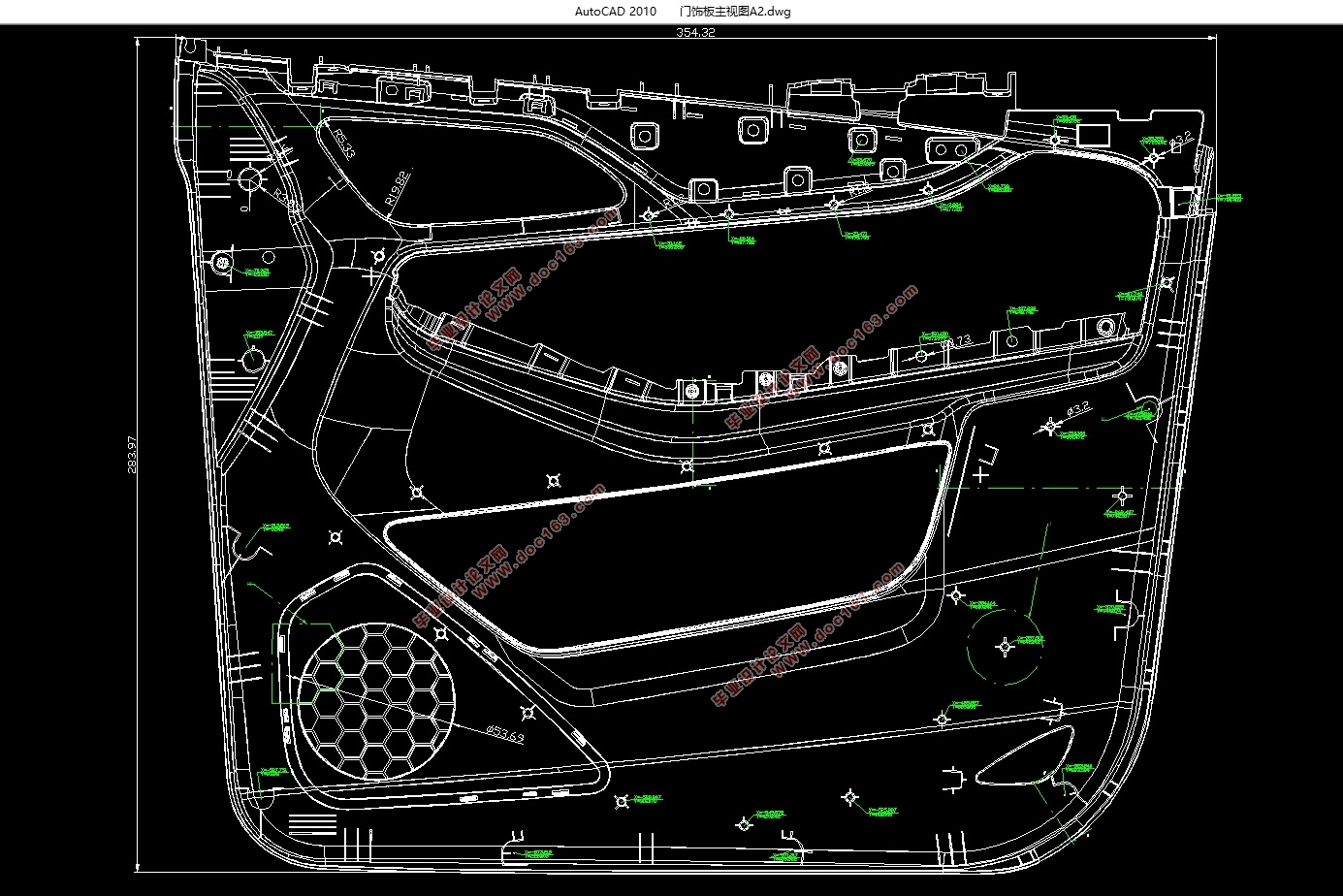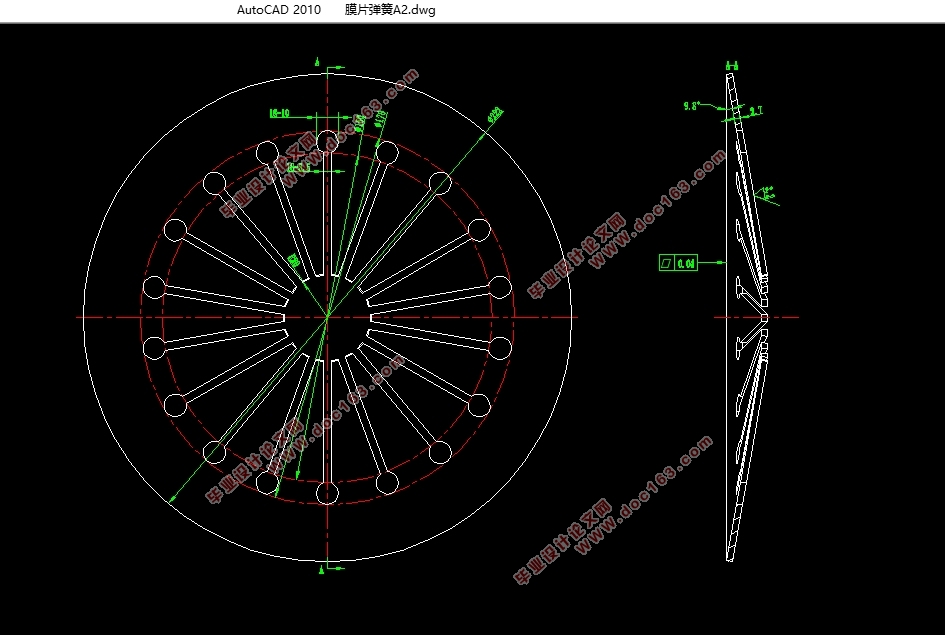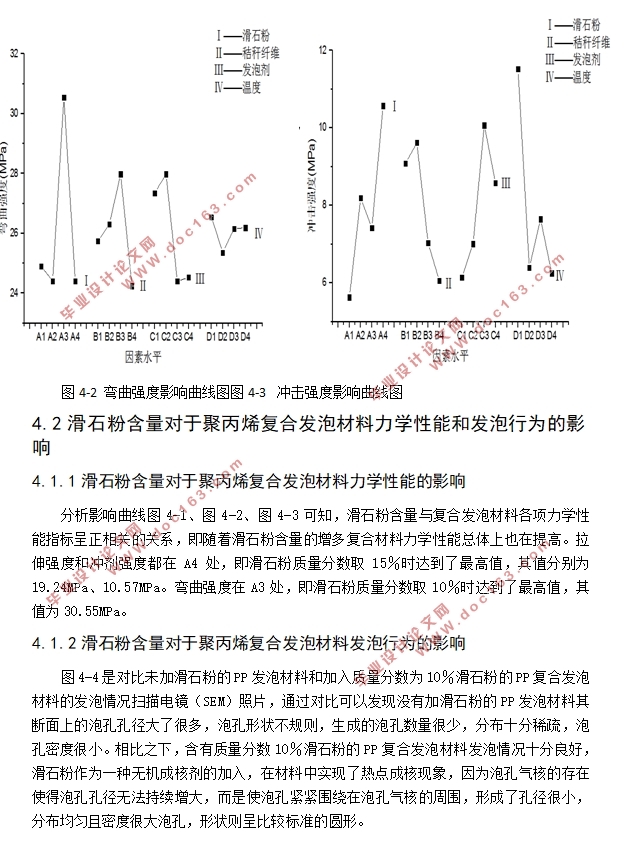汽车环保型内饰用复合材料制备与性能研究(含CAD图)

汽车环保型内饰用复合材料制备与性能研究(含CAD图)(任务书,开题报告,论文说明书24000字,CAD图纸3张)
摘要
本文将主要针对改性聚丙烯中滑石粉、秸秆纤维和发泡剂的不同配比,及不同工艺参数对其力学性能带来的差异进行研究,以揭示材料配比和工艺参数对其力学性能的影响规律,并获取最优配比和工艺参数的方案。具体研究内容与目标如下:研究材料配方对改性聚丙烯力学性能的影响规律;研究注塑成型工艺参数对改性聚丙烯力学性能的影响规律;基于改性聚丙烯综合力学性能对材料配比和工艺参数进行优化。在本次研究的聚丙烯改性体系下,各因素中对拉伸强度影响效果最明显的依次是发泡剂含量、滑石粉的含量、注塑温度、秸秆纤维含量;各因素中对弯曲强度影响效果最明显的依次是滑石粉的含量、秸秆纤维含量、发泡剂含量、注塑温度;各因素中对冲击强度影响效果最明显的依次是注塑温度、滑石粉的含量、发泡剂含量、秸秆纤维含量。
关键词:聚丙烯;秸秆纤维;滑石粉;复合发泡材料;力学性能
Abstract
In this paper, different proportions of talcum powder, straw fiber and foaming agent in modified polypropylene, as well as the differences in mechanical properties brought by different process parameters, are studied to reveal the influence of material ratio and process parameters on its mechanical properties, and to obtain the optimal ratio and process parameters scheme.Specific research contents and objectives are as follows: to study the influence of material formulation on the mechanical properties of modified polypropylene;The influence of injection molding process parameters on the mechanical properties of modified polypropylene was studied.Based on the comprehensive mechanical properties of modified polypropylene, the material ratio and process parameters were optimized.Under the polypropylene modification system studied in this study, the most obvious influences of various factors on tensile strength are the content of foaming agent, the content of talcum powder, injection temperature, and the content of straw fiber.Among all the factors, the most obvious effect on bending strength was the content of talcum powder, straw fiber, foaming agent and injection temperature.Among all the factors, injection temperature, talcum powder content, foaming agent content and straw fiber content have the most obvious effect on impact strength. In the study of polypropylene modification system, talcum powder as the material mechanical properties of reinforcing filler, the mass fraction and foam composite material mechanics performance index were positively correlated, the relationship between that with increasing of composite material mechanics performance of talcum powder content on the whole, also have improved, in this study did not appear with increasing mass fraction talcum powder in the composite foaming materials occur together, thus affecting the mechanics performance of composite materials. [来源:http://www.doc163.com]
Key words: polypropylene;Straw fiber;Talcum powder;Composite foamed material; properties of Mechanica
本文将主要针对改性聚丙烯中滑石粉、秸秆纤维和发泡剂的不同配比,及不同工艺参数对其力学性能带来的差异进行研究,以揭示材料配比和工艺参数对其力学性能的影响规律,并获取最优配比和工艺参数的方案。具体研究内容与目标如下:
(1)研究材料配方对改性聚丙烯力学性能的影响规律;
(2)研究注塑成型过程中注塑温度对改性聚丙烯力学性能的影响规律;
(3)分析得到此改性体系下的最佳配方和注塑温度。
1.5.3本研究的技术方案
(1)查找和阅读相关论文、期刊及专著等资料,熟悉试验设计思路和方法,掌握试验数据处理方法,学习发泡材料的扫描电镜(SEM)和光学显微镜图像的分析方法。
(2)完成试验设计。确定本文研究的影响因素和水平数,根据自学的正交试验设计原理和方法设计,根据正交性从全面试验中挑选出部分具有代表性的点进行试验。
(3)熟悉实验室设备。了解了试验过程中需要用到的塑料注塑成型机(HDX50)、冲击强度试验机(XJUD—5.5)、电子万能试验机(CMT6104)、熔融指数仪(MFI—1211)等设备的功能、特点及使用时的注意事项,并通过实际操作,掌握了各种设备的使用方法。
(4)制备试验用改性聚丙烯材料。根据既定试验方案,按照实验室标准操作流程,制备改性聚丙烯材料待测件。
(5)力学性能试验和总结。对每组试验材料进行拉伸强度、弯曲强度、冲击强度测试,总结各组对应的变量对材料力学性能的影响规律。
(6)微观组织结构观测。使用光学显微镜观察所选试样段的脆断面的微观结构。再次挑选,将光学显微镜下断面泡孔分布密集且均匀,泡孔孔径较小,秸秆纤维和滑石粉与PP基体结合情况较好的试样段选出,送材料测试中心拍摄扫描电镜(SEM)照片。
(7)根据试验数据,总结出秸秆纤维增强聚丙烯的最优材料配比和工艺参数,从而使其达到最好的综合力学性能。
(8)分析各因素分别对拉伸强度、弯曲强度以及冲剂强度的影响。
[版权所有:http://DOC163.com]




目录
摘要 I [资料来源:http://Doc163.com]
Abstract II
第1章 绪论 1
1.1汽车内饰用改性聚丙烯材料简介 1
1.2聚丙烯微孔发泡材料及其气核成核理论 1
1.2.1聚丙烯微孔发泡材料概述 1
1.2.2聚丙烯发泡注塑成型工艺简介 2
1.2.3发泡剂 3
1.2.4微孔发泡材料成核理论 4
1.2.5泡孔分析方法 5
1.3秸秆纤维/聚丙烯复合材料简介 5
1.3.1秸秆纤维/聚丙烯复合材料定义 5
1.3.2秸秆纤维的改性处理 6
1.4滑石粉/聚丙烯复合材料简介 6
1.5本研究的思路、内容和技术方案 7
1.5.1本研究的思路 7
1.5.2本研究的内容 7
1.5.3本研究的技术方案 7
第2章 实验部分 9
2.1试样制备 9
2.2实验原材料 10
2.3实验主要设备和仪器 10 [资料来源:https://www.doc163.com]
2.4力学性能测试与微观结构观察 11
2.4.1力学性能测试 11
2.4.2微观结构观察与泡孔密度计算 11
第3章 基于综合平衡法分析最优方案 13
3.1正交数据处理 13
3.2以拉伸强度为试验指标 15
3.3以弯曲强度为试验指标 15
3.4以冲击强度为试验指标 16
3.5正交试验数据综合分析 16
第4章各因素分别对复合发泡材料力学性能和发泡行为的影响 18
4.1各因素影响曲线介绍 18
4.2滑石粉含量对于聚丙烯复合发泡材料力学性能和发泡行为的影响 19
4.1.1滑石粉含量对于聚丙烯复合发泡材料力学性能的影响 19
4.1.2滑石粉含量对于聚丙烯复合发泡材料发泡行为的影响 19
4.1.3基于微观结构分析滑石粉对发泡材料力学性能和发泡行为作用机理 20
4.3秸秆纤维对于聚丙烯复合发泡材料力学性能和发泡行为的影响 21
[资料来源:https://www.doc163.com]
4.2.1秸秆纤维含量对于聚丙烯复合发泡材料力学性能的影响 21
4.2.2秸秆纤维对于聚丙烯复合发泡材料发泡行为的影响 22
4.2.3秸秆纤维粒径对复合发泡材料微观组织结构的影响 23
4.4发泡剂AC对PP复合发泡材料的影响 23
4.3.1发泡剂AC的热分解特性 23
4.3.2发泡剂AC质量分数对PP复合发泡材料泡孔结构的影响 24
4.3.3发泡剂AC对PP复合发泡材料力学性能的影响 25
4.5注塑温度PP复合发泡材料的影响 25
第5章 总结 27
5.1本次研究的主要结论 27
5.2对本次研究实施过程的反思 28
5.3展望 30
参考文献 31
致谢 33 [资料来源:https://www.doc163.com]
